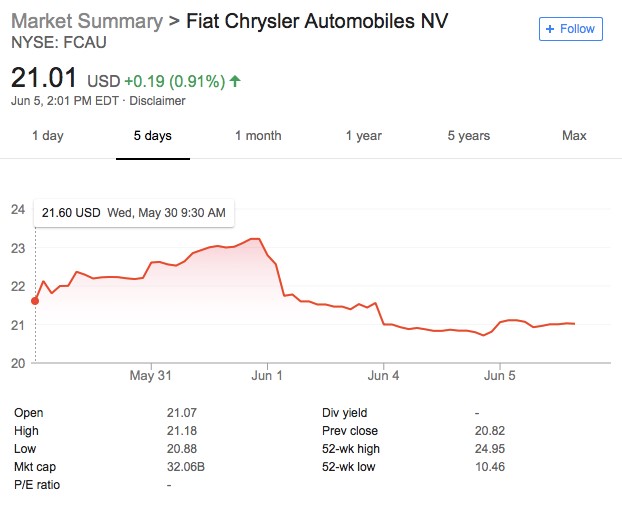It wasn't too long ago when the CEO of Fiat Chrysler, Sergio Marchionne, was dissing the whole idea of electric cars, calling them a “global threat”, and imploring people not to buy Fiat’s sole EV because the company was losing $14,000 on each car.
But times change fast these days. And even if Marchionne doesn’t like where it’s going, he’s still going to make sure Fiat gets there.
Fast forward to today, and Fiat-Chrysler has announced it is launching over 30 vehicles with some kind of electrification. Even more stunning, the auto giant estimates that 15 to 20 percent of its sales will be of models with "heavy electrification"—in other words, EVs or full hybrids.
It’s a whopping $10.5-billion investment and is part of its five-year revival plan that will take Fiat—long focused on the Ram, Maserati and Alfa Romeo—in an entirely different, plugged-in direction.
While Chrysler will become a North American brand only, Fiat will experience a slight transition to selling electric vehicles in Europe.
Marchionne’s been at the helm here for almost a decade and a half, and is eyeing 11-percent profit margins by 2022. Still, he hates EVs.
"The bulk of this business is producing earnings which are almost genetically predetermined," Marchionne said, "because of decisions that have been made in the past and which are now being executed in a market where that call has been made. The reality is 80 percent of the earnings of this house in 2022 are only going to come from the four brands that we heard about today."
FCA plans to leverage the Jeep and Ram brands at home and abroad with higher-margin products for both brands, while Maserati is targeting Tesla with its high-performance plug-in electric cars. Alfa Romeo is looking into China's rich premium market.
Related: Silver Stocks Continue To Struggle
Even though the fossil fuel-powered engines will still be the vast majority of Fiat-Chrysler’s portfolio, the company has vowed to respect emission standards, which will be an important part of maintaining European market share. FCA predicts that 60 percent of its cars sold in Europe by 2022 will be hybrid or fully electric, with diesel out of the portfolio.
“They have a lot to catch up on, particularly in China,” said Rebecca Lindland, an automotive analyst with Kelley Blue Book. “But just because they’re late to the party doesn’t mean they won’t have the best dress on.”
Some also hoped that the long-expected spin-off of Alfa Romeo/Maserati, or even Jeep, might soon be on the cards, or perhaps the once-talked-about merger with GM.
Investors wonder about required capital and share of spending needed for this electrification, according to Reuters.

(Click to enlarge)
Probably the biggest area of concern is Marchionne himself—but precisely because he’s announced he will retire next year and no one’s sure who will take over.
Related: The Stock Market Is Defying A Strong Jobs Report
“Often, if a highly successful manager leaves - like (Alan) Mulally at Ford Motor – the company doesn’t function as well and investors are worrying that this will happen with Fiat Chrysler,” said professor Ferdinand Dudenhoeffer, director of the Center for Automotive Research at the University of Duisburg-Essen. He believes that FCA's embrace of EVs was too late, and that this—coupled with Fiat’s lack of SUVs--would hinder success.
Though Marchionne has attempted to calm investors over his retirement, shares are still languishing in a bit of a fearful purgatory.

(Click to enlarge)
“We were surprised at the negative share price reaction as FCA’s capital markets day drew to a close. The company set ambitious targets which should result in positive earnings revisions across the board,” said Evercore ISI analyst George Galliers.
By Damir Kaletovic for Safehaven.com
More Top Reads From Safehaven.com:
















